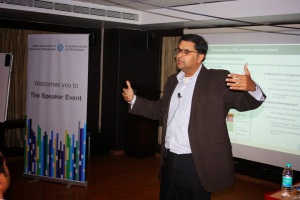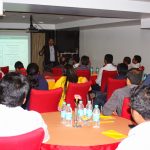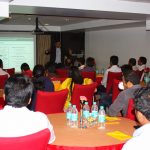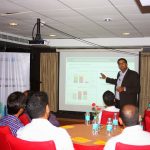- February 10, 2014
- Posted by:
- Category:Bengaluru, BLOG, Events, Speaker Events
 Contributed by: Abhimanyu L and Prahlada Varadan
Contributed by: Abhimanyu L and Prahlada Varadan
When people think of a CFA Charter holder in India, they think of valuation, research and analysis. But, what happens afterwards? What happens after you have valued a company and invested in it? How is this useful at a higher level of analysis? Ravi A. Gautham, Senior VP at Northern Trust- USA and Head of Northern Trust’s Asset Management in India, provided a perspective which was unique as it went beyond research, valuation and analysis of companies and industries. The event held on January 24th 2014 in Bengaluru was well received by the members.
Global pools of money:
The largest pools of money in management come from pension funds, sovereign wealth funds, endowment funds, and foundations – A big part this money is large institutional pension funds from the Western world. These funds were accumulated over a period of 70-80 years in the west and have grown significantly in size amounting to trillions of dollars.
Liability issues for Pension Funds:
These pension assets managed globally service pension liabilities for firms. For some firms, this liability became so huge that they were at times bigger than the balance sheet of the companies that provided for the pensions. This resulted in bankruptcies of some companies which caught the imagination the world – Notably, General Motors.
Anyone who could creatively solve these problems for the pension funds got the mandates to manage these pools of money. This is where PIMCO’s, Blackrock’s and NT’s come in, solve problems of the pension fund and get the mandate to manage money.
CFA Charter Holders and Portfolio Management:
How are these assets invested as part of the mandate? This is where the curriculum of the CFA institute comes into picture and is a space where CFA charter-holders have an advantage. The rigor with which we go through in attaining the charter is reflected in the work done by CFA charter holders. CFA charter holders understand portfolio construction, asset allocation, diversification etc., which are extremely useful in managing assets in the previously discussed context. After having analyzed industries and companies, understanding correlations and other concepts from the CFA curriculum these investment are grouped together to manage risk and provide an appropriate return. This process of portfolio construction and its application were discussed in great detail by Ravi.
Future for CFA charter holders in India:
Ravi believes that funds and fund managers will start using the techniques and processes that CFA program inculcates in its charter holders. The fundamental challenge is that there isn’t enough money in the market for these methodologies to be adapted. As the Indian economy grows, there will be the need to manage these funds and consequently the need for more CFA charter holders.
Ravi’s talk for most of us was an overview of the entire Portfolio Management section of the Level 3 curriculum of the CFA body of knowledge and its applications in real life. Ravi not only connected the dots in terms of how the curriculum is used in real life but also reinforced lessons learned while going through the program.
– A L and P V








